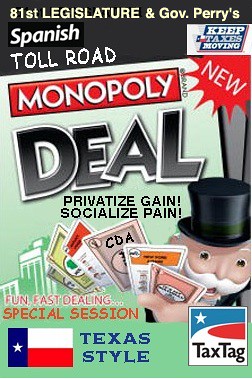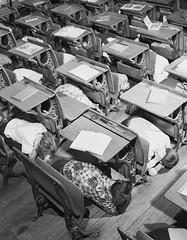"We have got a hellacious mess on our hands."
6/26/09
By MICHAEL A. LINDENBERGER
The Dallas Morning News
Copyright 2009
AUSTIN – For Dallas drivers, the governor's decision to summon lawmakers back to the Capitol next week to keep the Transportation Department in business will do little to keep traffic moving in North Texas or reduce its dependence on an ever-increasing number of toll roads.
Gov. Rick Perry wants lawmakers to extend the life of the Texas Department of Transportation, which will be shuttered in 2010 if no action is taken. He also wants new legislation that will let the agency borrow $2 billion more for road building and to extend Texas' ability to enter long-term contracts with private toll road developers.
But at public meetings this week, Texas' highway chiefs said even if lawmakers do all three things, the state faces a severe cash crisis that will probably stop nearly all new road building by 2012.
With a recession, Texans, like other Americans, are driving less. That means entities like the North Texas Tollway Authority are collecting fewer tolls, and it means that state departments of transportation are getting fewer dollars to build roads the old-fashioned way.
On Wednesday, chief financial officer James Bass told the Texas Transportation Commission that gas-tax receipts are down, even as debt payments are headed up. Since September, receipts are down $49 million, about 2.5 percent. In April alone, they were down 8 percent, or $15 million. The department's budget had anticipated a 1.5 percent increase.
Federal fund
The federal highway fund is in even worse shape, and Texas is almost certainly going to face reduced federal payments while Congress decides how to keep the fund solvent, Texas officials said this week.
Compounding the problem here, Texas lawmakers have in recent years provided just two new tools to build new roads: private toll-road agreements and permission to borrow. In both cases, the department has responded with gusto, but Bass said it may not be able to do so indefinitely.
Borrowing billions
By 2011, the state will be paying more than $1.6 billion every two years just to make debt payments, an amount that Bass said will escalate in future years. Given those concerns, he told commissioners this week that he was reluctant to authorize additional debt until he received new direction from them.
The commissioners' response? Full steam ahead, and borrow every penny available.
"Our obligation is to consistently and clearly communicate to the Legislature what our [financial] situation is," said Deirdre Delisi, chairwoman of the five-member commission. "As long as we are very clear with lawmakers, then our obligation is to use the tolls the Legislature has provided and build roads."
"Message received," Bass said, and the department will immediately begin the process of borrowing $2.9 billion. If lawmakers heed Perry's call next week, the agency will take steps to borrow another $2 billion.
Lawmakers could make the department's money problems go away, should they shower it with huge funding increases in 2011. If they don't, the agency says it will have to stop building most new roads by 2012.
The impact on North Texas would be significant, even though North Texas is far better off than Texas' other major metropolitan areas. Most of the $3.2 billion that the NTTA paid for the State Highway 121 project remains unspent, and construction crews will be drinking from that fountain of money for several years.
Trinity toll road
But North Texas nevertheless is counting on billions of dollars from the state to make many of its top-priority projects a reality.
Regional officials are desperate to build the Trinity toll road, although problems with the Trinity River levees have delayed construction for at least 20 months, and probably more.
NTTA says tolls on the 10-mile road probably will support no more than $450 million in debt. And faced with financial pressures of its own, authority chairman Paul Wageman said last week that the city should not expect any additional contributions from the authority.
Another big project that will likely require a nine-digit investment by the state is the so-called Pegasus Project that would rebuild the aging interstates that cut through downtown Dallas.
North Texas officials had hoped to avoid such scenarios when they pushed a local-option tax bill during the regular session of the 2009 Legislature. But lawmakers rejected the proposal, and resurrecting it in the special session seems unlikely, though its supporters may try.
Looking to Congress
Some area leaders now say the best bet is for North Texas to look to Washington for help, especially given plans in Congress to pass a new six-year transportation bill that many predict will have hundreds of billions of dollars of new money in it.
But on Thursday, former U.S. Secretary of Transportation James Burnley, who served under President Ronald Reagan, said in an interview that such hopes are misplaced – at least anytime soon.
The federal system, which also depends on gas-tax receipts, is in even worse shape than Texas. And there is "absolutely" no way a transportation bill will pass this year, he said, noting President Barack Obama's focus on health care.
"There is no solution in the next two years," said Burnley, now a Washington lawyer whose firm is heavily involved in transportation. "We have got a hellacious mess on our hands."
© 2009 The Dallas Morning News: www.dallasnews.com
To search TTC News Archives click
To view the Trans-Texas Corridor Blog click

















